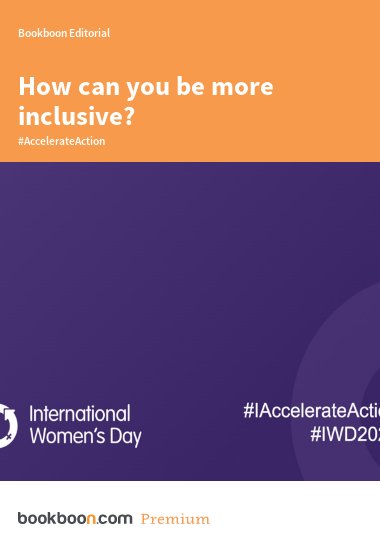You probably know how it feels to be excluded. Have you ever felt like you’ve been left out of a decision at work? Or ignored in a conversation? There may be situations when you don’t feel valued or respected. Imagine if this consistently happened to you because of characteristics you can’t change.
We see ‘inclusion’ mentioned often in company mission statements, yet according to the World Economic Forum, it will take until 2158 to reach full gender parity. While it will take time to build positive systemic change, we can all take small steps towards inclusivity, creating a powerful ripple effect.
Here are some simple things you can start doing today to start being more inclusive.
1. Call out stereotypes
If someone is making assumptions about people based on certain characteristics, such as gender, race or age, call it out to ensure you challenge these beliefs. Here are some tips how to do so.
-Don’t call out the person, but focus on the behaviour. This reduces tension and maintains respect. For example, “I don’t think this this assumption holds true…”
-Ask questions to encourage the person to think more critically. “What makes you say that?” or “Have you considered other perspectives?”
2. Challenge discrimination
Acting as soon as you see discriminative behaviour or language helps ensure people feel respected and valued. There are several ways to do it.
-Speak up when you see the behaviour in a calm and respectful way. Express how the behaviour is harmful. “I don’t think that comment is appropriate. It’s important we treat everyone with respect.”
-Gently educate others. Share resources that promote inclusivity and build understanding of different perspectives.
If it’s happening in a professional setting, don’t forget to involve a manager or senior person if the behaviour continues or is causing significant distress.
3. Question bias
In order to process large amounts of information efficiently, our brains naturally make quick judgments and assumptions. These biases are shaped by our experiences, societal influences, culture, and past interactions and without us realising it, they can often influence our actions or decisions.
That’s why it’s important to reflect on your own biases and challenging them. If you notice one forming, stop and ask yourself “Is this based on evidence or assumptions?”, “Is this true?” or “How might this impact others?”. Rely on objective data rather than assumptions.
You can also use the same reflection tactics if you find yourself in a group making generalisations. This encourages open dialogue where others feel comfortable addressing concerns about biases.
4. Encourage diverse perspectives
Make a conscious effort to get input from others. For example, you can ask “Does anyone have a different perspective on this?”. Be mindful of group dynamics and redirect conversations if the same people seem to be dominating. If there’s someone who seems quiet or disengaged in the conversation, directly ask for their input in a low-pressure way such as “I’d love to know your thoughts on this, [Name].”
As Chichi Eruchalu, an executive coach says; Inclusivity is “…all about creating an honest, open, and transparent environment where everybody feels that their voice is heard. They can contribute. They can give feedback. And it’s safe to make mistakes and also be themselves.”
By implementing these acts every day, you’ll build stronger relationships. Everyone will feel valued and respected, including yourself. So, which one will you start with?


